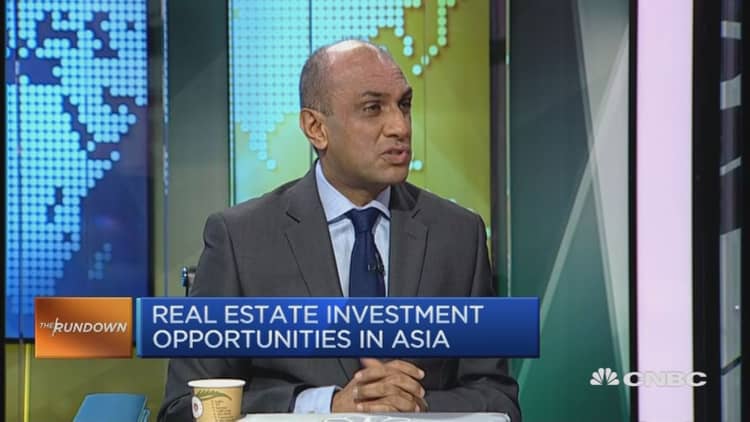
Asia's property investors are pulling back from fresh investments as they keep a nervous eye on whether interest rates head higher, an investor survey from CBRE found.
Fewer property investors were intending to deploy more capital this year, with only 37 percent intending to buy more, down from 42 percent last year, the survey found. And more investors, led by real estate funds, were looking at yield spreads, it found.
"Traditionally, investors were looking for capital appreciation, but this year, the investors are focused on the yield gap. They want to have a cushion for when they evaluate the deals," Henry Chin, head of research for Asia-Pacific at CBRE Asia-Pacific, told CNBC's "Squawk Box" on Thursday.
Around 28 percent of investors were motivated by yield spreads over the risk-free rate this year, up from just 10 percent last year, the survey found.
Chin said CBRE has been telling investors worried about how interest rates will perform to focus on rental growth
"The yield compression story probably for our region is gone," he said.
Fewer property investors were worried about a global economic shock, down to 25 percent from 46 percent last year, but 14 percent were worried interest rates might rise faster than expected, up from 6 percent last year.
That's a shift from the usual concerns about whether China's slowing economy would face a hard landing, Chin noted.
In recent years, investors have chased compressing yields in property. Typically, as yields fall, capital values rise.
Interest rates appeared set to head higher soon, with the market pricing in odds for the U.S. Federal Reserve to hike in March at as high as 80 percent, up from just over 50 percent after four Fed presidents spoke Tuesday, and all indicated an interest rate hike could be considered in March.
Whatever the timing of the hike, it's likely to push up yields on U.S. Treasurys, suggesting a higher "risk-free rate" and making property yields look less attractive comparatively.
When it comes to investment destinations, Chin noted that Australia remained among the top picks.
That's despite long-running concerns parts of the country may be experience a bubble after years of low rates, sharp price rises and strong inflows.
"Australia continues to be a very attractive destination for cross border investment," Chin said. "It's very strong fundamentals. Sydney and Melbourne office rental growth are going to be top three for the next three years."
He added, "Liquidity and transparency are also very good given the geopolitical risk we are facing in the U.S. and the U.K."
CBRE surveyed more than 500 institutional investors, including asset managers, developers, REITs, private equity, sovereign wealth funds and individuals, who were interested in Asia real estate.
CBRE wasn't alone in noting property investors' continued interest in Australian real estate.
Kiran Patel, global chief investment officer at Savills Investment Management, told CNBC's "The Rundown" on Thursday that he still saw opportunities in Australian property.
But Patel noted that he was looking in some less-well-traveled areas, such as Perth, despite concerns over oversupply and a downturn in the region's commodity-intensive industries.

"If you look at the commodity markets, there was a dip in 2015, but we've seen a significant rise in commodity prices," Patel noted, adding, "Perth is one of those markets where there is an amount of supply, but that supply is already in the pricing and future supply is likely to be curtailed."
But he noted that he was less positive on some of the hotter markets Down Under, such as Melbourne and Sydney, advising looking at the edge of central business districts and in fringe areas instead.
Although many institutional investors are more focused on commercial property sectors, concerns over Australia's housing market have been festering for quite some time.
In a report published Thursday, the OECD noted in its economic survey of Australia that low interest rates have driven up house prices and mortgage lending to historical highs. The Reserve Bank of Australia has set its benchmark rate at a record-low of 1.5 percent.
The OECD recommended maintaining tight macro-prudential measures to rein in prices and facilitating housing supply increases. But it added that there was a risk that a fall in housing prices could have "significant macroeconomic implications," with the potential for a rout.
—By CNBC.Com's Leslie Shaffer; Follow her on Twitter @LeslieShaffer1


